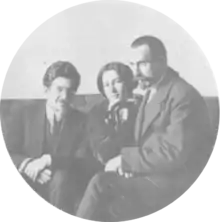Lydia Dan
Lydia Osipovna Dan (Russian: Ли́дия О́сиповна Дан; née Tsederbaum; 21 May 1878 – 28 March 1963) was a Menshevik revolutionary leader and active participant in the revolutionary movement of Russia.
Lydia Osipovna Dan | |
|---|---|
 Lydia Dan (centered), with Semyon Vainshtein (left) and Irakli Tsereteli (right) Irkutsk (1914–1915). | |
| Born | Lydia Osipovna Tsederbaum May 21, 1878. |
| Died | March 28, 1963 (aged 84) New York City, New York, United States |
| Occupation | Menshevik revolutionary |
| Spouse | Fyodor Dan |
Her brother was the Menshevik leader Julius Martov, her husband was fellow Menshevik Fyodor Dan.
Biography
Early life
Dan was born to a middle-class, educated and politically aware Jewish family in Odessa in 1878. Her brother was fellow Menshevik leader Julius Martov.
She entered the Russian Social Democratic Labour Party in the mid-1890s, and was a member of the first social-democratic circles in St. Petersburg.
Political life
Lydia Dan was attracted to Marxism by its appeal as a 'path of reason', as she called it, which could guide mankind to civilisation, enlightenment and modernity. She also felt drawn to it by its 'sociological and economic optimism, its strong belief, buttressed by facts and figures, that the development of the economy, the development of capitalism, by demoralising and eroding the foundations of the old society, was creating new social forces (including us) which would certainly sweep away the autocratic regime together with its abominations', but also noting that youths like her were drawn to it because of its 'European nature', breaking with the provincialism of Russian society, holding 'out a promise that we would not stay a semi-Asiatic country, but would become a part of the West with its culture, institutions, and attributes of free political system. The West was our guiding light.'[1]
During the famine of 1891, Lydia Dan called the co-operation between the Neo-Populists and the Marxists 'a new era', believing it to be a landmark of the revolution as it showed her generation 'that the Russian system was completely bankrupt. It felt as though Russia was on the brink of something'.[2]
Dan was critical of Lenin and other Marxists', dubbed 'Politicals', who wanted to organise a centralised party and use for political ends. She would later write that 'many of us associated such a party with what the People's Will had been'.[3] On the writing of Lenin's What Is To Be Done?, Lydia recalled: 'None of us could imagine that there could be a party that might arrest its own members. There was the thought or the certainty that if a party was truly centralised, each member would submit naturally to the instructions or directives.'[4] During the Second Party Congress of the Social Democratic Party, which saw the split of the party into the Menshevik and Bolshevik factions, she came to side with her brother Martov, not because of his abilities or because she believed he was right on the issue, but because she felt Martov was noble, having 'an inexhaustible charm', although 'poorly suited to be a leader'. Writing further, she admitted that 'it was very tragic to have to say that all my sympathies for Lenin (which were considerable) were based upon misunderstanding'.[5] Early in the conference, she had also noted that the relation between Martov and Lenin had become colder than it was in Munich.[6] Despite her disagreements with Lenin, she still believed that the 'Economists' were a greater enemy than the Bolsheviks.[7]
After losing her first job, she got a job in a company owned by the Bundist American millionaire S. S. Atran.[8]
She acted as the godmother of Yuri Larin in the “incongruous baptism … undertaken in a tsarist prison so that Larin could have an Orthodox marriage entitling him to take his bride into exile”.[9]
Exile and later life
She went in exile in 1922 and later wrote her memoirs.
She died in New York City in 1963.[10]
References
- Figes, p. 140–141
- Figes, p. 161–2
- Figes, p. 149
- Figes, p. 151
- Figes, p. 153
- Liebich, p. 36
- Liebich, p. 42
- Liebich, p. 219
- Liebich, p. 234 and 408 (note 38)
- "Mrs. Lydia Dan, Aide of Russian Emigres". New York Times, 3 April 1963. p. 47.
Bibliography
- Figes, Orlando (2014). A People's Tragedy: The Russian Revolution 1891–1924. London: The Bodley Head. ISBN 9781847922915.
- Liebich, André (1997). From the Other Shore: Russian Social Democracy After 1921, vol. 5. Cambridge, Massachusetts & London, England: Harvard University Press. ISBN 9780674325173. Retrieved 29 August 2016.